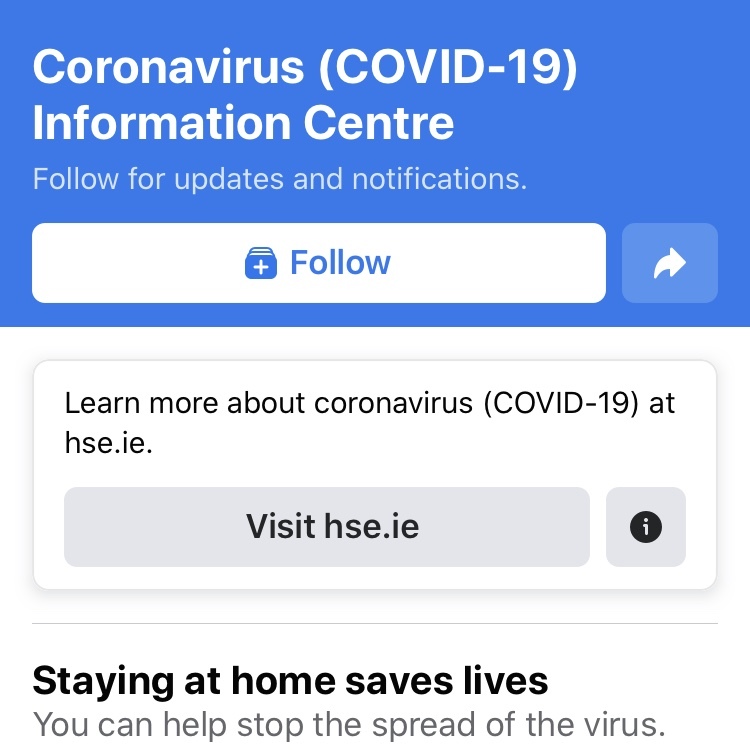For several weeks now, the world has rightly been consumed with talk of COVID-19. For Facebook, it has been no different. Globally, our entire company is focused on doing our bit to tackle the coronavirus outbreak. We are approaching this in four ways.
- Connecting people to accurate and authoritative information
- Supporting governments and partners in their public health efforts
- Preventing the spread of harmful misinformation and other misuse of our platforms
- Supporting small businesses
For several weeks now, the world has rightly been consumed with talk of COVID-19. For Facebook, it has been no different. Globally, our entire company is focused on doing our bit to tackle the coronavirus outbreak. We are approaching this in four ways.
- Connecting people to accurate and authoritative information
- Supporting governments and partners in their public health efforts
- Preventing the spread of harmful misinformation and other misuse of our platforms
- Supporting small businesses
As MLI members, or those interested in media literacy, you will be most interested in how we are connecting people to accurate and authoritative information and preventing the spread of misinformation, particularly here in Ireland. Let me take you through these important measures.
At the outset, anyone who searches for information related to the coronavirus on Facebook or Instagram is shown educational pop-ups and search results connecting them to the HSE’s dedicated coronavirus landing page. On both Facebook and Instagram, we have been prompting people to visit the HSE’s website for accurate information through in-Newsfeed pop-up posts. Indeed, we have supported greater visibility of verifiable and authoritative advice on our platforms by granting the HSE free ad credits to promote their public health messaging. From March 8th-28th, these prompts have resulted in 154,890 visits to the HSE’s website. Over the past weekend, we launched the COVID-19 Information Centre. This provides a central repository for Facebook users to get the latest updates from the HSE, WHO and UNICEF. In time, it will provide additional resources and tips for staying healthy and looking after one’s wellbeing. Globally, we have directed more than 1 billion people to resources from health authorities including the WHO.

It is important that everyone has a place to share their experiences and talk about the coronavirus, but as our Community Standards make clear, it is not acceptable to share something that puts people in danger. Under our misinformation and harm policy, we are removing coronavirus-related misinformation that could result in harm to people who believe it. We are focusing on misinformation that has been flagged by global and local health authorities and claims that are designed to discourage treatment or encourage harmful false cures, such as “drinking bleach cures the coronavirus”.
Our global network of third-party fact-checkers is continuing their work reviewing content and debunking false claims. In Ireland, we work with thejournal.ie. When one of our fact-checkers rate information as false, we limit its spread on Facebook and Instagram and show people accurate information from these partners. We also send notifications to people who have already shared or are trying to share this false content to alert them that it has been fact-checked. We recently partnered with the Poynter Institute’s International Fact-Checking Network (IFCN) to launch a $1M grant programme to support fact-checkers in their work around the coronavirus.
We have launched a Whatsapp Coronavirus Hub to provide guidance on how to use Whatsapp in an effective and responsible way during the coronavirus crisis. It offers ways in which health professionals, educators and local businesses can use the app to communicate important updates, and shift some of their now disrupted daily activities onto WhatsApp. Users of the app can read important tips to help prevent the spread of rumours and fake news. We have built clear labels that show people when they have received a forwarded message, or chain message, so they know when something was not written by their immediate contacts. We have also set a limit on the number of times messages can be forwarded on WhatsApp to reduce the spread of viral messages. Using advanced machine learning, we can identify and ban accounts engaged in mass messaging. Similarly, we will soon begin testing stricter limits on Messenger to control the number of forwarded messages.
We are working closely with others in our industry – Google, LinkedIn, Microsoft, Reddit, Twitter and YouTube – on the coronavirus response efforts as they pertain to combating misinformation and elevating authoritative content.
This is by no means an exhaustive overview of Facebook’s efforts to date. We have made near-constant announcements about proactive measures since the first case was detected in Ireland, and we will continue to do so. As the coronavirus outbreak escalates, our focus is on keeping people safe and informed, supporting and partnering with global health experts and stopping misinformation.
At Facebook, our thoughts are with those who have lost loved ones; the victims and vulnerable; and frontline workers who are fighting this pandemic. We all have a role to play. Facebook is committed to playing ours – in Ireland and around the world – to best serve our communities.
You can keep up to date on all Facebook’s efforts surrounding the coronavirus by visiting our website: about.fb.com/news/coronavirus
Stephanie Anderson |Public Policy Associate Manager, Ireland | Facebook